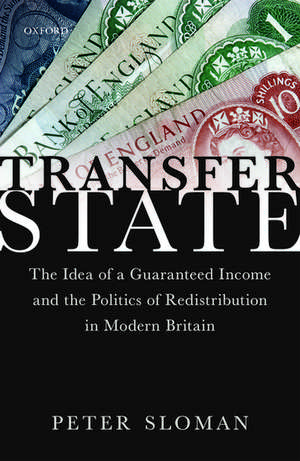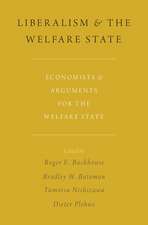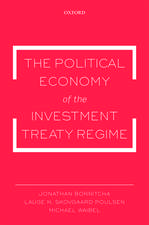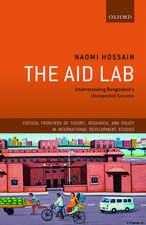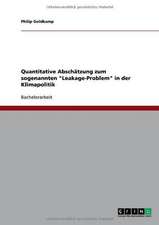Transfer State: The Idea of a Guaranteed Income and the Politics of Redistribution in Modern Britain
Autor Peter Slomanen Limba Engleză Hardback – 30 oct 2019
Preț: 570.83 lei
Preț vechi: 757.80 lei
-25% Nou
Puncte Express: 856
Preț estimativ în valută:
109.26€ • 118.72$ • 91.84£
109.26€ • 118.72$ • 91.84£
Carte tipărită la comandă
Livrare economică 09-15 aprilie
Preluare comenzi: 021 569.72.76
Specificații
ISBN-13: 9780198813262
ISBN-10: 0198813260
Pagini: 318
Dimensiuni: 160 x 241 x 24 mm
Greutate: 0.61 kg
Editura: OUP OXFORD
Colecția OUP Oxford
Locul publicării:Oxford, United Kingdom
ISBN-10: 0198813260
Pagini: 318
Dimensiuni: 160 x 241 x 24 mm
Greutate: 0.61 kg
Editura: OUP OXFORD
Colecția OUP Oxford
Locul publicării:Oxford, United Kingdom
Recenzii
Peter Sloman is a slyly counterintuitive historian, whose study of the basic income in modern Britain reveals the surprising origins of this increasingly visible public policy.
The book is an impressive piece of work. Sloman has carefully and thoughtfully complied historical accounts to show a detailed and rich tapestry of ideas, policies and ideologies underpinning guaranteed income floors.
The Universal Basic Income (UBI) is much discussed. Peter Sloman examines its history in relation to that of UK redistributive welfare policies... Sloman present a clear account of the emergence of UBI and the arguments for and against, without raising hopes that it is realistically on the horizon.
In UBI histories, the normative and the descriptive easily shade into one another, often at the expense of history itself... Cambridge historian Peter Sloman's 2019 book Transfer State is a rare and notable exception. More than a conceptual hagiography, Sloman's book offers a history of the 'idea' of a basic income in British thought over the last 100 years, tracking its travails through policy circles, trade unions,and government cabinets... [and] recontextualizes the UBI within a wider timeline of conceptions of redistribution and social policy.
Peter Sloman's aim in this thoroughly researched book is to 'illuminate a neglected dimension of British social thought, and help explain the enduring appeal of providing an income floor for citizens through cash transfers'... Any future history of the social security system in the UK, and any future history of reform proposals, will have to stand on Sloman's shoulders.
Peter Sloman has produced a fascinating, comprehensive, detailed, forensic economic history of UK welfare philosophy, politics and practice, which he interprets and evaluates against the criterion of fit to the concept of universal basic income.
This book is a foundational contribution to the historiography of the guaranteed minimum income...The future of the transfer state may be uncertain, but Sloman's book is undoubtedly the landmark history of its development.
The book is an impressive piece of work. Sloman has carefully and thoughtfully complied historical accounts to show a detailed and rich tapestry of ideas, policies and ideologies underpinning guaranteed income floors.
The Universal Basic Income (UBI) is much discussed. Peter Sloman examines its history in relation to that of UK redistributive welfare policies... Sloman present a clear account of the emergence of UBI and the arguments for and against, without raising hopes that it is realistically on the horizon.
In UBI histories, the normative and the descriptive easily shade into one another, often at the expense of history itself... Cambridge historian Peter Sloman's 2019 book Transfer State is a rare and notable exception. More than a conceptual hagiography, Sloman's book offers a history of the 'idea' of a basic income in British thought over the last 100 years, tracking its travails through policy circles, trade unions,and government cabinets... [and] recontextualizes the UBI within a wider timeline of conceptions of redistribution and social policy.
Peter Sloman's aim in this thoroughly researched book is to 'illuminate a neglected dimension of British social thought, and help explain the enduring appeal of providing an income floor for citizens through cash transfers'... Any future history of the social security system in the UK, and any future history of reform proposals, will have to stand on Sloman's shoulders.
Peter Sloman has produced a fascinating, comprehensive, detailed, forensic economic history of UK welfare philosophy, politics and practice, which he interprets and evaluates against the criterion of fit to the concept of universal basic income.
This book is a foundational contribution to the historiography of the guaranteed minimum income...The future of the transfer state may be uncertain, but Sloman's book is undoubtedly the landmark history of its development.
Notă biografică
Peter Sloman is Senior Lecturer in British Politics at the University of Cambridge and a Fellow of Churchill College. He was a Junior Research Fellow at New College before moving to Cambridge in 2015. His first book, The Liberal Party and the Economy, 1929-1964 (Oxford, 2015) examined how British Liberals engaged with economic thought in the era of John Maynard Keynes and William Beveridge. He has also published articles in a number of leading journals and has contributed to the Oxford Dictionary of National Biography.
